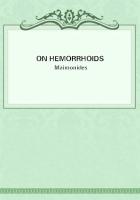He waited, looking down upon her tired eyelids, and at the row of lashes lying upon each cheek, whose natural roundness showed itself in singular perfection now that the customary pink had given place to a pale luminousness caught from the surrounding atmosphere. The dumpy ringlets about her forehead and behind her poll, which were usually as tight as springs, had been partially uncoiled by the wildness of her ride, and hung in split locks over her forehead and neck. John, who, during the long months of his absence, had lived only to meet her again, was in a state of ecstatic reverence, and bending down he gently kissed her.
Anne was just becoming conscious.
'O, Mr. Derriman, never, never!' she murmured, sweeping her face with her hand.
'I thought he was at the bottom of it,' said John.
Anne opened her eyes, and started back from him. 'What is it?' she said wildly.
'You are ill, my dear Miss Garland,' replied John in trembling anxiety, and taking her hand.
'I am not ill, I am wearied out!' she said. 'Can't we walk on. How far are we from Overcombe?'
'About a mile. But tell me, somebody has been hurting you-- frightening you. I know who it was; it was Derriman, and that was his horse. Now do you tell me all.'
Anne reflected. 'Then if I tell you,' she said, 'will you discuss with me what I had better do, and not for the present let my mother and your father know. I don't want to alarm them, and I must not let my affairs interrupt the business connexion between the mill and the hall that has gone on for so many years.'
The trumpet-major promised, and Anne told the adventure. His brow reddened as she went on, and when she had done she said, 'Now you are angry. Don't do anything dreadful, will you. Remember that this Festus will most likely succeed his uncle at Oxwell, in spite of present appearances, and if Bob succeeds at the mill there should be no enmity between them.'
'That's true. I won't tell Bob. Leave him to me. Where is Derriman now. On his way home, I suppose. When I have seen you into the house I will deal with him--quite quietly, so that he shall say nothing about it.'
'Yes, appeal to him, do. Perhaps he will be better then.'
They walked on together, Loveday seeming to experience much quiet bliss.
'I came to look for you,' he said, 'because of that dear, sweet letter you wrote.'
'Yes, I did write you a letter,' she admitted, with misgiving, now beginning to see her mistake. 'It was because I was sorry I had blamed you.'
'I am almost glad you did blame me,' said John cheerfully, 'since, if you had not, the letter would not have come. I have read it fifty times a day.'
This put Anne into an unhappy mood, and they proceeded without much further talk till the mill chimneys were visible below them. John then said that he would leave her to go in by herself.
'Ah, you are going back to get into some danger on my account?'
'I can't get into much danger with such a fellow as he, can I?' said John, smiling.
'Well, no,' she answered, with a sudden carelessness of tone. It was indispensable that he should be undeceived, and to begin the process by taking an affectedly light view of his personal risks was perhaps as good a way to do it as any. Where friendliness was construed as love, an assumed indifference was the necessary expression for friendliness.
So she let him go; and, bidding him hasten back as soon as he could, went down the hill, while John's feet retraced the upland.
The trumpet-major spent the whole afternoon and evening in that long and difficult search for Festus Derriman. Crossing the down at the end of the second hour he met Molly and Mrs. Loveday. The gig had been repaired, they had learnt the groundlessness of the alarm, and they would have been proceeding happily enough but for their anxiety about Anne. John told them shortly that she had got a lift home, and proceeded on his way.
The worthy object of his search had in the meantime been plodding homeward on foot, sulky at the loss of his charger, encumbered with his sword, belts, high boots, and uniform, and in his own discomfiture careless whether Anne Garland's life had been endangered or not.
At length Derriman reached a place where the road ran between high banks, one of which he mounted and paced along as a change from the hard trackway. Ahead of him he saw an old man sitting down, with eyes fixed on the dust of the road, as if resting and meditating at one and the same time. Being pretty sure that he recognized his uncle in that venerable figure, Festus came forward stealthily, till he was immediately above the old man's back. The latter was clothed in faded nankeen breeches, speckled stockings, a drab hat, and a coat which had once been light blue, but from exposure as a scarecrow had assumed the complexion and fibre of a dried pudding-cloth. The farmer was, in fact, returning to the hall, which he had left in the morning some time later than his nephew, to seek an asylum in a hollow tree about two miles off. The tree was so situated as to command a view of the building, and Uncle Benjy had managed to clamber up inside this natural fortification high enough to watch his residence through a hole in the bark, till, gathering from the words of occasional passers-by that the alarm was at least premature, he had ventured into daylight again.
He was now engaged in abstractedly tracing a diagram in the dust with his walking-stick, and muttered words to himself aloud.
Presently he arose and went on his way without turning round.
Festus was curious enough to descend and look at the marks. They represented an oblong, with two semi-diagonals, and a little square in the middle. Upon the diagonals were the figures 20 and 17, and on each side of the parallelogram stood a letter signifying the point of the compass.














